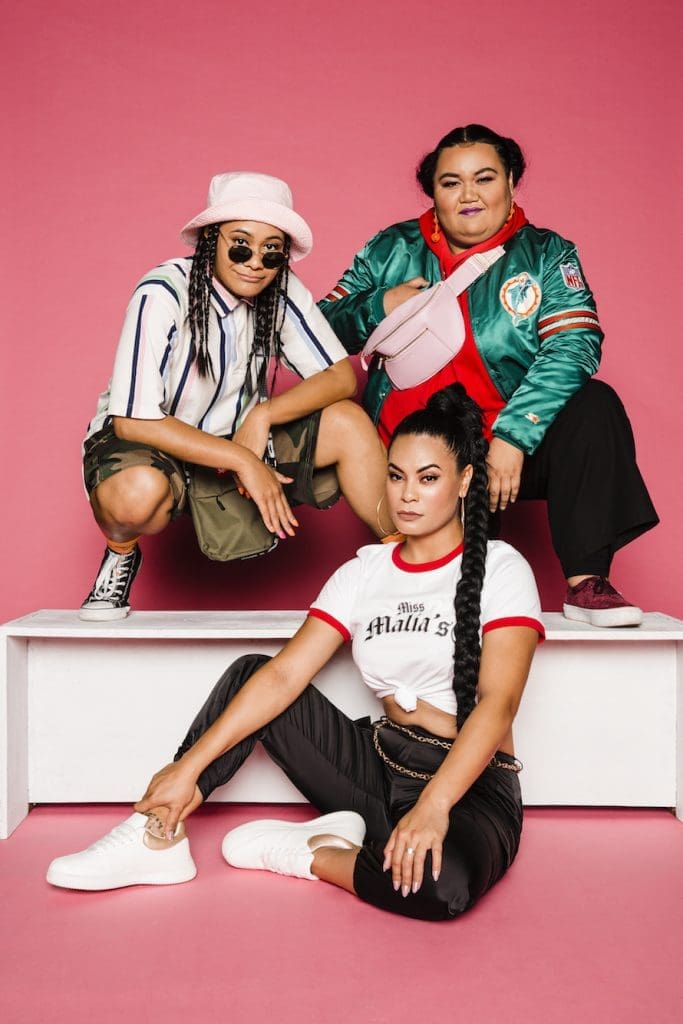It would be an understatement to say that the timing of Hanelle Harris’s 2020 has been full on. Two projects erupted into her life at very interesting points of the year – her show SIS, a Polynesian sketch comedy series about three female friends, started on screens just as there was a resurgence of the Black Lives Matter movement around the world – and a long-overdue call to amplify the voices of non-white storytellers came with it. And then her third child also added to this mix, being born on Hanelle’s 30th birthday… in the middle of New Zealand’s level four lockdown.
“I found out I was pregnant the week we started SIS, so I was probably six months pregnant while we were shooting… and then we went into lockdown,” Hanelle Harris tells Capsule over the phone. “The whole schedule went out the window, but it was really sweet because we were in level four, and it was my 30th birthday, and I got to get out of the house and have a baby on my birthday, in the middle of a pandemic. So that is a pretty cool story for him!”
She found the timing of SIS starting on Comedy Central in July, just as the BLM protests around the world were reaching their full power, just as interesting. “We started writing the show in 2018 and those were the things we wanted to talk about, so the fact that two years later, when we finally released it, that globally there was this awareness happening… it felt like people were finally going to listen. It definitely impacted the way people digested the work and the way they will continue to digest the work.”
SIS, which is available on Neon, tackles big themes like racism but it does it in a premise that is joyful, inclusive and whole-hearted. This was a very conscious choice, Hanelle says, because not only is comedy a very effective way to get a message across but because she wanted to show a difference to the ‘trauma porn narrative’ that so often is the only representation of Māori and Pasifika. “Thirty years after Once Were Warriors, we’re still seeing gang films – and that stuff has a place and is important but the problem is that firstly, we’re usually not the ones telling those stories and, secondly, when there is no other representation to counter balance that” – she pauses, and sighs – “you end up with a lot of misconceptions out there in the wider NZ public. That then keeps the segregation between Māori and Pacific Islanders and then the rest of the country, because we will always be seen as lower socio economic people that tick the boxes of these really terrible statistics… but no-one actually wants to acknowledge that we live and exist in the normal world as well.”

One of the reasons the world of SIS feels so real and lived in is because it follows the relatively new trend of having the showrunners be behind the scenes as well as in front of the screen – like Michaela Cole’s I May Destroy You, or Issa Rae’s Insecure (both available on Neon). “Issa and Michaela are great show runners and have really strong voices,” Hanelle says. “Stories always seem stronger when the voices behind the scenes match the faces on the screen. It’s because it’s our lived experience – we’re telling it from the inside out, rather than from the outside in.”
Global conversations like Black Lives Matter have helped focus the spotlight on who is getting the opportunities – and the funding; Hanelle cites Asian-Australian writer, Michelle Law, who referred to this time as being “the #metoo movement for race.”
“In Aotearoa, as Māori and Pasifika practitioners, we’re really saying ‘you need to give us the money and the resources to tell our own stories, because we’re constantly being spoken for. And the stories are constantly being filtered by a Pākehā lens… and that can be damaging. Because when they create those narratives for us, they don’t live with the very real-life consequences of what that kind of stereotyping does. To this day, I still get followed around when I’m in a shop.”
There have been numerous opportunities offered to her over the years, Hanelle says, which would have great for her personally but would have required her to compromise her values. “It’s hard, because if you’re someone like me and you’ve dreamed of being an actor since the age of five – and it’s your dream and your life purpose – there comes an intersection where it’s ‘how much will you trade for what you really want?’ ‘Who am I willing to become to get the thing that I want?’ If what I’m doing is not in service of my people and of my community, then I don’t want to do it at all.”
That’s a hard battle for any working professional, let alone a mother, like Hanelle, who is the bread-winner for her partner and three children. “That’s when I have to dig deep spiritually,” she says. But the overwhelmingly positive feedback to SIS speaks to how important story sovereignty is. “We’ve received so many incredible messages from young Pasifika and Māori women about what SIS means to them; they were the spiritual touchstone for the show – we wanted to have those young women feel seen and heard.”
The tight bond between the characters in SIS is a love letter to the “divine, feminine” power of female friendship, Hanelle says. “For us, as brown girls, ‘sis’ is a word that is so loaded. ‘Sis’ is someone you trust, someone who’s ride or die, someone who’s got your back, who loves you unconditionally. You see it with the three main characters – that connection. We all need to be connected with one another to feel whole. Being connected is the purpose of being human.”
SIS premieres on Prime from 18 November, 9.30pm, visit here for more information

